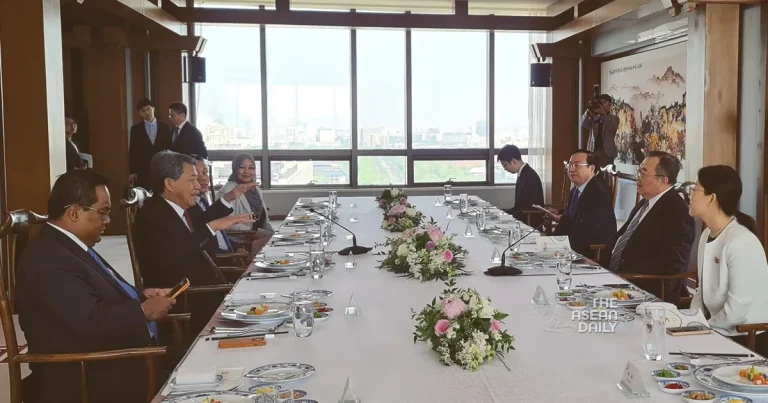26-4-2024 (BEIJING) In a move that reinforces Malaysia’s stance on the contentious South China Sea issue, Foreign Minister Mohamad Hasan has unequivocally stated that his country opposes “external forces” meddling in the region’s affairs. The remarks were made during a meeting in Beijing with Wang Yi, China’s top diplomat, as the two nations celebrated the 50th anniversary of their diplomatic ties.
Speaking at the event, Mohamad Hasan made it clear that foreign interference in the region was not welcomed, echoing China’s long-held position that the dispute should be resolved among regional parties without external involvement. According to a statement issued by China’s foreign ministry, the Malaysian minister’s comments were made during his visit to Beijing to commemorate the golden jubilee of diplomatic relations between the two countries.
Malaysia, one of several nations with overlapping territorial claims in the South China Sea, has long advocated for a regional solution to the complex maritime dispute. The minister’s remarks largely mirrored China’s stance, which maintains that “external forces” should not be involved in the matter.
In a testament to the close ties between the two nations, Wang Yi praised Malaysia as “an important member of ASEAN [the Association of Southeast Asian Nations], a representative of emerging economies, and a positive and stable force in the Muslim world.” He further promised that China would improve coordination with Malaysia and stand up and speak for the interests of the Global South on the international stage.
The readout from the Chinese side also revealed that both diplomats discussed strengthening economic cooperation and exchanged views on international issues, underscoring the broad scope of their discussions.
Mohamad Hasan expressed Malaysia’s appreciation for China’s stance on the Palestinian-Israeli conflict, while Wang reiterated China’s desire to work with Malaysia to promote an early, comprehensive, just, and lasting solution to the issue, according to the readout.
The Malaysian foreign minister’s visit comes at a time when the United States and the Philippines are engaged in their annual two-week bilateral joint military exercise, Balikatan 2024, in the South China Sea until May 8. The exercise has drawn criticism from China, with the United States and Japan jointly backing the Philippines and accusing Beijing of “dangerous and aggressive behavior” in the region.
Disputes between Beijing and Manila over areas of the South China Sea have intensified in the past year, particularly over resupply missions to a Philippines’ outpost at the Second Thomas Shoal. Manila has denied a “gentleman’s agreement” between Beijing and former president Rodrigo Duterte and has sought support from its treaty ally, the United States, as well as Japan.
While mainland China claims most of the South China Sea, the Philippines, Malaysia, Vietnam, Brunei, and Taiwan also have overlapping claims to the resource-rich waters, further complicating the territorial dispute.
On Thursday, Chinese defense ministry spokesman Senior Colonel Wu Qian echoed the sentiment of rejecting “external interference” in the South China Sea, referring to the US-Philippines exercise. He stated, “We oppose external interference, muscle flexing, provocations, and harassment in the South China Sea, and oppose exclusive circles or bloc confrontation.”




